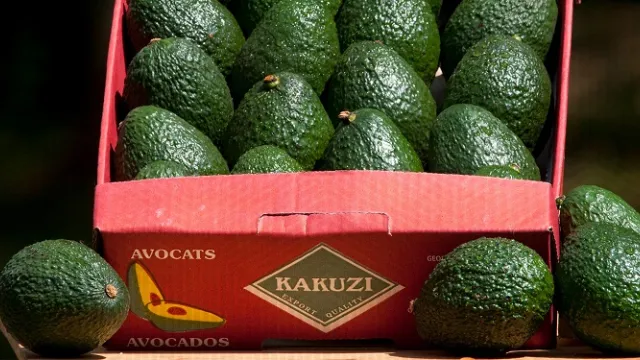By going big on super foods, Kakuzi cements base for sturdy growth

By going big on super foods, Kakuzi cements base for sturdy growth
Off along a well maintained, winding dirt road in the expansive Kakuzi estate, workers are busy tending to a vast farm of blueberries.
The area under the fruit is approximately 10 hectares and the produce is destined to the dining tables across Kenya.
"We are not exporting for now. We sell everything here in Kenya through various retail outlets," said Dr Wilson Odiyo, Kakuzi Plc Assistant General Manager Corporate Affairs.
Often marketed as super food, blueberries are small, round juicy fruits that are an excellent source of vitamins, beneficial plant compounds, and antioxidants that are good for your body.
Kenya's fruit exporting company, Kakuzi, has been steadily growing value in agriculture and the roughly four-year-old blueberries venture is one of the latest additions into its stable of super foods.
In the year ended December 2020, Kakuzi’s avocado and macadamia export volumes were higher than the previous year, helping Kakuzi post a pre-tax profit of Kes 848 million while paying their network of smallholder farmers Kes 58 million which was about 85 per cent of the company’s net returns.
Read also: Kakuzi’s grit shows agriculture stocks could change NSE outlook
The contribution to the overall results by macadamia was encouraging and reflects the benefits of having a diversified product portfolio, says new Board Chairman Nicholas Ng’ang’a in his 2020 note to shareholders.
In 2020, Kakuzi’s macadamia exports went up 30 per cent than 2019, the company disclosures show.
“There is a growing demand for super foods, such as blueberries, within the East African market and we will continue to explore this opportunity,” adds Mr Ng’ang’a.
Kakuzi has been working with farmers across Kenya under their acavado smallholder programme by providing quality seeds, farm extension services, fruit maturity tests, access to the export markets while in turn getting a steady supply of the green gold.
At the moment, the company is working with a pool of over 3000 small holder avacado farmers spread across Kiambu, Kirinyaga, Nyeri, Murang'a, Embu, Nakuru and a number of counties in Kenya’s North Rift region.
Last year, Kakuzi share gained 13 per cent at the Nairobi Securities Exchange (NSE) even as the pandemic created significant disruption in their main European markets with the almost complete closure of food service businesses.
Other agriculture stocks that gained at the NSE in 2020 were tea exporters Kapchorua 2.4 per cent and Williamson 7.9 per cent as well as coffee exporter Eaagads 19.1 per cent.
Avocados are increasingly becoming a high-value crop with a container of the fruit earning close to Kes 4 million in the overseas markets.
Read also: Centum wants to sell Two Rivers stake but admits market is not conducive
However, challenges abound for small scale exporters, who can easily suffer huge losses owing to inadequacy in their cold chain logistics as well as lack of critical information on overseas markets.
Early last year, a group of smallholder avocado exporters from Kenya said they lost about Kes 200 million in already shipped consignments over non-payment as potential buyers rejected their supplies.
To help mitigate the impact, however, Kenyan fresh produce exporters and traders trading in the Middle East gained access to Dubai’s export insurance provider to cover for losses where buyers default on already exported goods.
The Etihad Credit Insurance, a UAE Federal export credit company, agreed to offer exporters from Kenya up to $200,000 (about Kes 21 million) insurance for up to five months.
The initiative will go a long way in helping cushion exporters from the loses occasioned by unexpected rejection of their produce.
In Kenya, agricultural contributes to approximately 31 per cent of the country’s Gross Domestic Product translating to about Kes 3.1 trillion in annual earnings.
Currently, Kakuzi, Vegpro, Sunripe, Kenya Horticultural Exporters, and East African Growers companies are the leading exporters of avocado fruit from Kenya, which is primarily sourced from smallholder farmers who constitute about 70 per cent of the country’s production.
Last year, Kakuzi suffered reputational costs following a suit in which a law firm sought to bring it under UK jurisdiction but the case was dropped in July.
Since then, the company has embarked on adopting modern corporate governance excellence standards and the first environment, social and governance report is expected this year.
This is in addition to opening a community liaison office where the company’s water and sanitation, health and education outreach programmes that help uplift the lives of the community are managed.
In the wake of the Covid-19 pandemic, Kakuzi rolled out safe reopening of schools programme by providing desks, handwashing infrastructure, facemasks and thermoguns to about 70 neighbouring schools, some of which sit on land donated by the company.
Globally, avacados, macadamia, blueberries and a wide range of nuts form part of super foods, edibles that an increasing number of consumers are going for as the quest for healthy eating habits gains traction.



